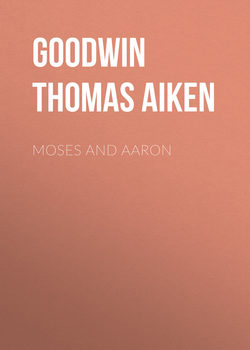Читать книгу Moses and Aaron - Goodwin Thomas Aiken - Страница 10
THE FIRST BOOK
TREATETH OF PERSONS
CHAP. IX.
Of the Assideans
ОглавлениеIt is much controverted, whether the Assideans were Pharisees or Essenes, or what they were. Were I worthy to deliver my opinion, or, as the Hebrews Proverb is, To thrust in my head among the heads of those wise men; I conceive of the Assideans thus: Before their captivity in Babylon, we shall find the word חסידים Chasidim, (translated Assidæi, Assideans) to signifie the same as, צדיקים Tsaddikim, Just, or good men: both were used promiscuously, the one for the other, and both stood in opposition to the רשעים Reschagnim, that is, ungodly or wicked men. At this time the whole body of the Jews were distinguished into two sorts, Chasidim, and Reschagnim, good, and bad.
After their captivity, the Chasidim began to be distinguished from the Tsadikim.87 The Tsadikim gave themselves to the study of the Scripture. The Chasidim studied how to add unto the Scripture.88 Secondly, The Tsadikim would conform to whatsoever the Law required. The Chasidim would be holy above the Law. Thus to the repairing of the Temple, the maintenance of sacrifices, the relief of the poor, &c. they would voluntarily add over and above, to that which the Law required of them. Whence it is noted, that those were Chasidim who would say, What is mine, is thine; and what is thine, is thy own: those Reschagnim, which would say, What is thine is mine; and what is mine, is my own. And it is probable, that the middle sort mentioned in the same place, who would say, what is mine, is mine; what is thine, is thine own, were the very Tsadikim.
At this time the body of the Jews were distinguished into three sorts, in respect of holiness. First, Reschagnim, ἀσεβεῖς, Wicked and ungodly men. Secondly, Tsadikim, δίκαιοι, Just and righteous men. Thirdly, Chasidim, who are sometimes translated ὅσιοι, Holy men, and that for the most part:89 but sometimes also ἀγαθοὶ, Goodmen: These of all others were best reputed, and beloved of the people. The Apostle shewing the great love of Christ, dying for us, amplifieth it by allusion unto this distinction of the people: Christ died for the ungodly. Scarcely for a righteous man will one die, yet peradventure for a good man some would even dare to die, Rom. 5. 6, 7. The gradation standeth thus; Some peradventure would die, for one of the Chasidim, a good man: scarcely any, for one of Tsadikim, a just, or righteous man; for the Reschagnim, or ungodly, none would die: Yet Christ dyed for us ungodly, being sinners, and his enemies.
Now as long as these Works of supererogation remained arbitrary, and indifferent, not required as necessary, though preferred before the simple obedience to the Law; so long the heat of contention was not great enough to breed Sects and Heresies: But when once the Precepts and Rules of supererogation were digested into Canons, and urged with an opinion of necessity; then from the Chasidim issued the brood of Pharisees;90 and also from them (as it is probably thought) the Heresie of the Essenes, both obtruding unwritten Traditions upon the People, as simply necessary, and as a more perfect rule of sanctity than the Scripture. At this time the Tsadikim in heat of opposition rejected not only Traditions, but all Scripture, except only the five books of Moses; for which reason they were called Karaim. Some are of opinion,91 they rejected only traditions, and embraced all the books of Scripture: Which opinion soever we follow; they had their name קראים, Karaim, Textuales, Scriptuarii, i. Text-men, or Scripture-readers, because they adhered to Scripture alone, withstanding and gain-saying Traditions with all their might. And if we follow the latter, then all this while the Karaim were far from Heresie: but in process of time, when from Sadock, and Baithus, these Karaim learned to deny all future rewards for good works, or punishment for evil, or resurrection from the dead; now the Karaim became compleat Sadduces, and perfect Hereticks, taking their denomination from their first Author Sadok. The time of each Heresies first beginning, shall be more exactly declared in their several Chapters.
87
D. Kimchi. Psal. 103. 17.
88
Pirke Aboth. c. 5.
89
Assidæi, de quibus agitur 1 Machab. 7. 13. vocantur à Josepho. lib. 12. cap. 16. ἀγαθοὶ καὶ ὅσιοι τοῦ ἔθνους.
90
Joseph. Scalig. Trihæres. c. 22.
91
Joseph. Scalig. ib.
